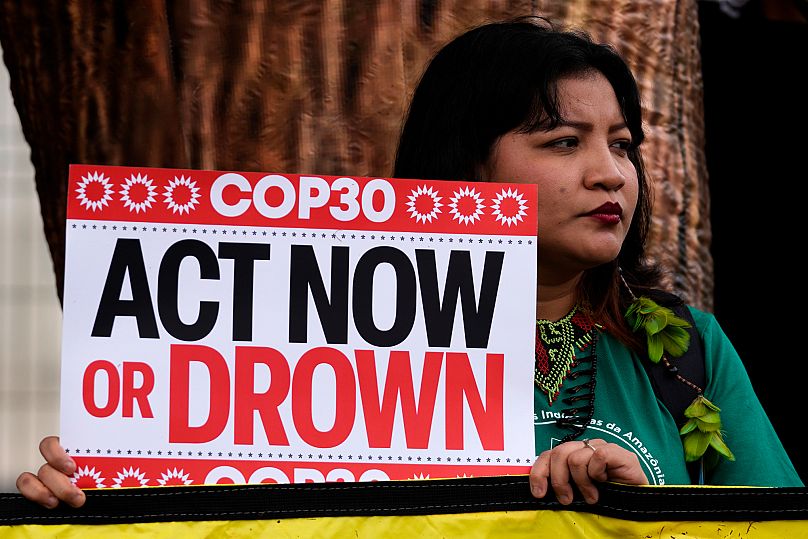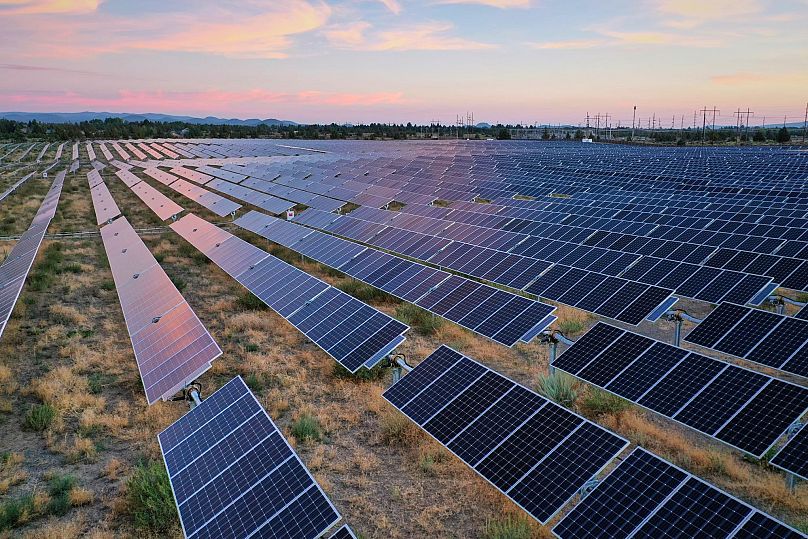EU talks will continue on two key climate targets — 2035 and 2040 — ahead of the upcoming COP30 summit in Belém, Brazil.
EU environment ministers have again delayed a decision over national emissions targets for 2035 and 2040, just weeks before the UN climate change summit in Belém, Brazil, where the bloc is expected to present its contribution to green goals.
Pressure to set an ambitious 2035 target to present at COP30 comes as the EU is struggling to settle a 2040 climate goal at home.
Both targets will affect European industries through major upfront investment and the reskilling of workers, ultimately sending a strong signal to businesses and investors.
The European Commission has proposed a binding target of 90% emissions reduction by 2040 under the bloc’s climate law, which sets the EU on course for climate neutrality by 2050. This was discussed by environment ministers at a Council meeting on Tuesday.
The 2040 climate target will impact the EU’s national climate action plans (the 2035 goal) under the Paris Agreement, expected to be presented at COP30. This is seen as the bridge from near-term action to the long-term 2050 net-zero objective.
"We must leave Belém with a clear path forward to keep 1.5°C within reach," Lars Aagaard, Denmark's minister for energy, climate, said on Tuesday on behalf of the Danish presidency of the EU.
"Next step is EU’s National Determined Contributions (NDC) [2035 climate target] and the Climate Law, and we stand ready to carry on after the strategic discussion between the European heads of state and government," he added.
EU leaders previously failed to reach a deal on the 2035 target ahead of the UN Framework Convention on Climate Change (UNFCCC) in September, instead proposing a range to cut CO2 emissions by 66.25% to 72.5% compared to 1990 levels.
EU heads of state are now due to discuss the "various enabling factors" and the conditionalities that will back an "ambitious and realistic" target for 2035 and 2040 at the Council summit on 23 October, according to EU Climate Commissioner Wopke Hoekstra.
However, no decision is expected to be taken on either of the targets during the Council summit.
"Leaders will task us to continue this conversation [debate on 2035 and 2040 climate targets] and seek to close it at the next Environment council," Hoekstra told reporters in Luxembourg.
An extraordinary meeting of environment ministers will be held on 4 November, when a formal proposal on both targets is expected.
'We will fall short'
Under the Paris Agreement, countries must submit or update their Nationally Determined Contributions (NDCs) every five years.
The EU's NDC needs to be updated to include its 2035 target and reflect intermediate goals — such as the controversial 2040 climate target — to be presented at COP30.
"If you’re looking at what the NDC will be like, it is safe to assume that we will fall short," Hoekstra said, noting the bloc was still ahead of China's weak ambition or even the US, which has abandoned its climate efforts.
"We’re doing more than our fair share ourselves, that’s what the conversation is going to be about," Hoekstra added.
While the EU's NDC is formally adopted by member states, the bloc's 2040 climate target will be enacted as an amendment to the European Climate Law, passed in 2021.
However, several countries, including Denmark, have pushed to adopt both targets simultaneously, arguing this would strengthen the EU’s position to advocate for higher global ambition at COP30.
But France, Germany, Hungary, Italy and Slovakia are among those resisting the 2040 climate target, calling for a lower goal and demanding more flexibility to ensure their industries remain competitive in the shift to zero-carbon technologies.
Key issues under discussion among EU ambassadors include the role of international carbon credits — tradable certificates allowing the emission of a set amount of CO2 — in achieving the 2040 target.
Negotiators are also debating how to ensure such credits do not interfere with the EU’s Emissions Trading System (ETS), and whether CO2 storage outside the bloc should be allowed.
In a letter sent to governments on 20 October, Commission President Ursula von der Leyen reiterated support for the 90% target and suggested the path to achieving it would include “significant flexibilities.”
"Part of the target — 3% in the Commission's proposal — can be reached with high quality international credits. Our domestic target for emission reductions can be lower than 90%, as long as this is compensated by similar and cost-efficient, high-integrity reductions outside of the EU," von der Leyen wrote.
However, many environmental groups have criticised the proposed flexibilities, arguing that such carbon offsets would undermine the integrity of the targets by allowing reductions abroad rather than within the EU.
Decarbonisation and competitiveness
The EU’s 2035 and 2040 climate targets are intended to accelerate Europe’s path to decarbonisation.
That trajectory is meant to increase near-term investment and compliance costs for energy-intensive industries and raise transitional price pressures for fossil fuel–dependent households. It would also pave the way for long-term and sustainable market opportunities in clean technology, energy efficiency and low-carbon exports.
The distribution of effort will depend on how national governments deploy targeted funds and industrial support to protect vulnerable households and preserve competitiveness — one of the key sticking points among member states.
"Decarbonisation is something we need to do for climate but equally important for competitiveness and for our independence. All three go hand in hand and we do need to make sure that going forward none is going at the expense of the others," said Hoekstra.
The climate commissioner said it was an "absolute imperative" to reduce external dependencies during the transition, acknowledging the "complexity" and "paradoxical" nature of the task.
More than half of the emissions reductions required to meet Europe’s 2040 targets depend directly on expanding electricity grids, scaling renewable generation, electrifying transport, and deploying large-scale energy storage, according to a new report from Boston Consulting Group (BCG) and Dansk Industri.
The study estimates the bloc will need around €12 trillion in infrastructure investment by 2040 to remain competitive.
'Strategic opportunity'
After several failed attempts to reach an agreement, scientists urged EU leaders to make an urgent decision on the 2040 climate target in an open letter penned on 20 October.
"The EU must adopt a 2040 climate target of at least 90–95% domestic reduction in greenhouse gases," the letter said.
The primary data points supporting this position are clear: evidence indicates that decisive decarbonisation is not only a climate necessity but a strategic economic opportunity," the scientists wrote, referring to potential savings of hundreds of billions on fossil fuel imports and the creation of over two million jobs in clean industrial sectors.
Global instability, technological advancement, rising inequalities and policy credibility are the key four risks that could eventually derail the successful delivery of the 2040 climate target, according to a report from the think tank Bruegel.
While the Brussels-based think tank considers the target feasible based on previous modelling, it notes that such efforts will require a 50% increase of renewable electricity generation, a 75% reduction in fossil fuel use compared to 2019, energy efficiency measures and deep electrification across transport, industry, and housing.
"A global economy with more trade disputes and greater risk of conflict endangers the massive capital investment needed for the transition, while the cost of clean technologies is a primary determinant of the economic viability of decarbonisation," read Bruegel’s policy report.
Joseph Dellatte, head of energy and climate studies and resident fellow at the Institut Montaigne, said Europe can no longer delay a decision on the 2040 target.
"If we want to be an actor, a manufacturer of the future decarbonisation and the technologies of the decarbonisation, or if we want to be a mere customer. This is what is at stake with the target and with the instrument that will follow the target," said Delatte.













